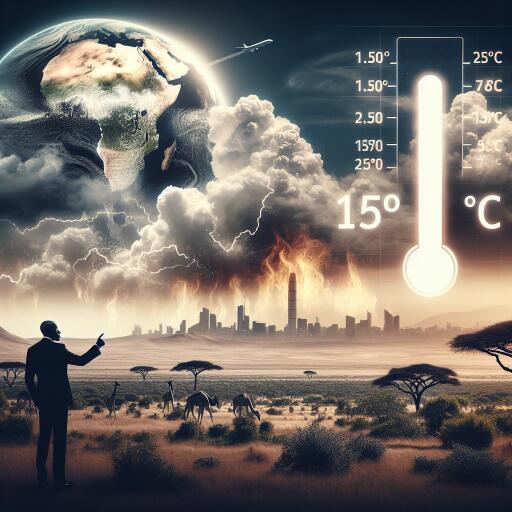
Africa: Without Accelerated Action, We Will Miss the Chance to Limit Warming to 1.5°c, Says UNEP Chief Climate Advisor
In a critical disclosure ahead of COP29, Anne Olhoff, the Chief Climate Advisor at the United Nations Environment Programme (UNEP), emphasizes the importance of stepping up climate change efforts. “We are at a pivotal moment—the next six years are crucial for limiting global warming to 1.5°C,” she cautions.
Olhoff highlights that while setting ambitious goals is important, the focus must immediately shift to action. “Immediate action outweighs ambition,” she insists, especially for bridging the current gap between scientific understanding and policy-making.
As Chief Climate Advisor, Olhoff works within the UNEP Copenhagen Climate Centre, where she offers policy guidance, advocates for climate strategy implementations, and lends her expertise in international science-policy and research on climate change. With over 25 years of experience, she leads UNEP’s prominent Emissions Gap Report, which aligns 70 scientists from various global institutions to deliver findings influencing climate strategies on a global scale.
As the ‘No more hot air … please’ 2024 emissions report nears publication, Olhoff discusses the urgency for action and adaptation in the context of climate change.
Evaluating the Role of COP29
Speaking about expectations from COP29, Olhoff illustrates a specific aim: to direct conversations and preparations for the subsequent Nationally Determined Contributions (NDCs). Although not delving deeply into COP29, the report seeks to shed light on the present scenario and necessary actions, ideally aiding dialogues in Baku and beyond.
Science-Policy Advice: Navigating Net-Zero Targets
Olhoff notes the pivotal role of science-policy advice. Through the Emissions Gap Report, UNEP endeavors to supply science-based, relevant updates for international climate discussions. Unlike the six-year interval of IPCC reports, this annual report fills a crucial void by offering readily applicable insights that have been well-received globally.
Indeed, 75-83 percent of national delegations have integrated the Emissions Gap Report into their climate negotiations and UN submissions, attesting to its value.
Insight from Years of Leading Climate Reports
Reflecting on her leadership of the Emissions Gap Report, Olhoff asserts that while direct changes are hard to identify, the reports have undeniably spotlighted essential issues and sectors needing urgent attention to accelerate emissions reductions across economies.
Adaptation Versus Mitigation: Identifying Immediate Priorities
According to Olhoff, agriculture and forestry offer significant potential for synergies with climate goals, yet energy systems are equally crucial. Emphasizing reductions in emissions is a priority, as lightening the adaptation burden later is only feasible through present-day mitigation efforts.
Evolution of UNEP’s Approach and Recent Developments
Olhoff discusses how temperature projections have improved since the early days of the report—they are now about half a degree lower than in 2010. While progress is evident, she warns that more action is necessary to ensure equitable benefits of renewable energy advancements for all nations.
Maintaining Quality in Global Scientific Collaboration
The rigorous process of the Emissions Gap Report mirrors that of the IPCC. With esteemed author teams, steering committees comprising IPCC and UNFCCC experts, and meticulous external reviews, UNEP strives to uphold high scientific standards while drafting this annually anticipated report.
Trends and Innovations Moving Forward
Olhoff identifies the upcoming biennial transparency reports as influential in tracking progress and learning. As existing technologies allow substantial reductions, the addition of innovative solutions and improved transparency remains essential for fostering accountability.
Interdisciplinary Collaboration in Climate Policy Shaping
Interdisciplinary collaboration stands as an indispensable element in formulating policies that bridge health, disaster management, and climate resilience. Olhoff emphasizes understanding complex system interconnections to transcend limitations of isolated approaches.
Balancing Scientific Integrity and Political Sensitivities
Maintaining integrity by sticking to scientific principles is critical, Olhoff explains. Through collaborations and peer-review processes, UNEP ensures diverse perspectives are integrated, allowing credible, unbiased climate strategy advice to flourish.
A Just Transition Away from Fossil Fuels
Transitioning from fossil fuels poses challenges, especially for developing countries. Despite renewables’ cost-competitiveness, financial and technical support is crucial for these nations. Countries will need investment-ready plans, coupled with compensation mechanisms, to shift from fossil fuel reliance without harming their economies.
The Urgency of Climate Action
Olhoff stresses that COP29, though crucial, is not the sole defining moment for climate action. The true focus lies on immediate actions at the country level—strengthening the ambitions articulated in the NDCs must coexist with tangible steps undertaken without delay.
As the Emissions Gap Report underscores, every pause only escalates the risks and costs of irreversible climate impacts. The time to act is now—or we risk unattainable climate targets.





Leave a Reply